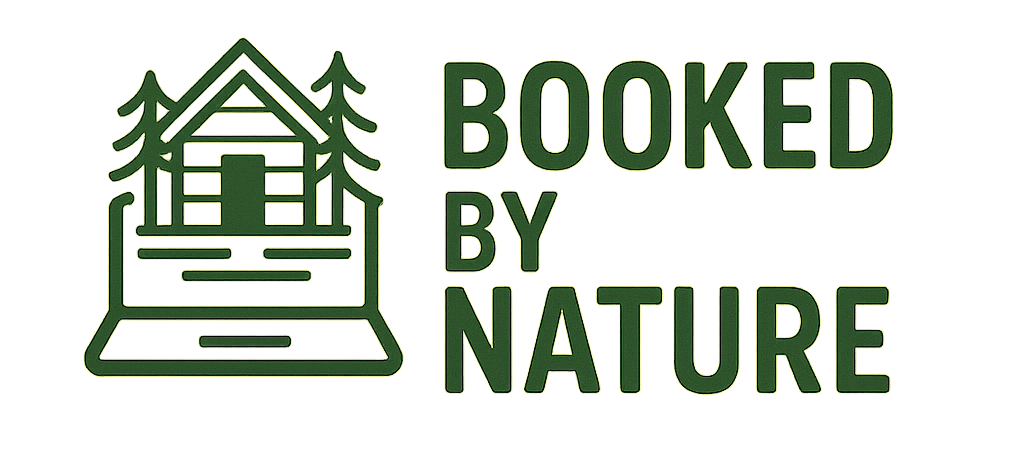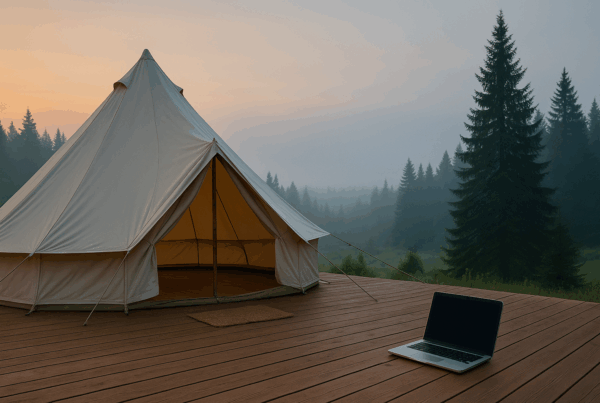
In the competitive world of glamping and unique accommodations, trust is perhaps your most valuable currency. Today’s travelers are more discerning than ever—they’re not just booking a place to stay; they’re investing in an experience they’ve likely been anticipating for months. Before committing their hard-earned vacation budget, they need to trust that your property will deliver the escape they’re envisioning.
This is where a professionally branded website becomes not just a marketing tool, but a powerful trust-building platform that can significantly increase your direct booking conversion rates and foster guest loyalty that extends beyond a single stay.
Why Trust Matters More for Unique Accommodations
Standard hotel rooms come with predictable expectations. Glamping and unique stays, by contrast, often involve elements that might cause hesitation for guests:
- Remote locations away from urban conveniences
- Unfamiliar accommodations (yurts, domes, treehouses)
- Nature-integrated experiences with varying comfort levels
- Higher price points than conventional lodging
- Potentially limited reviews on familiar platforms
These factors create a higher “trust threshold” you need to overcome. Guests need more reassurance before booking your magical treehouse or eco-pod than they would for a standard hotel room.
The Trust Gap in OTA Listings
While platforms like Airbnb provide a level of institutional trust through their review systems and payment protection, they also present significant limitations:
- Restrictive formatting that makes all listings look similar
- Character limits that prevent in-depth storytelling
- Standardized photography layouts that can diminish your property’s unique character
- Generic communication templates that lack personality
- Platform-focused branding that prioritizes their identity over yours
The result? On OTAs, your extraordinary glamping experience often gets reduced to just another listing, with minimal opportunity to establish the emotional connection that builds true trust.
The Trust-Building Elements of a Branded Website
A dedicated website allows you to create a complete trust ecosystem that addresses guest concerns at every stage of the decision journey:
1. Visual Authenticity
On your website: Immersive photo galleries showcase every aspect of your property from multiple angles, in different lighting and seasons, with no artificial constraints on quantity or presentation.
Trust impact: Guests can visualize themselves in the space, with no surprises upon arrival. Complete visual transparency signals confidence in your offering.
2. Storytelling Depth
On your website: Share your full creation story, host background, property history, and vision in an engaging narrative that connects emotionally with potential guests.
Trust impact: Personal stories humanize your business and create an emotional investment before guests even arrive. They’re no longer booking with an anonymous host but with real people whose passion comes through in your storytelling.
3. Guest Testimony Control
On your website: Feature detailed guest testimonials with photos, specific experiences, and personal stories that highlight exactly what made their stay memorable.
Trust impact: Curated social proof targeting the specific concerns of your ideal guests builds confidence more effectively than generic reviews. Seeing others like them enjoy your property makes the booking decision feel safer.
4. Detailed Policies & Expectations
On your website: Clearly articulate all policies, from booking to checkout, in language that matches your brand voice rather than platform-dictated terms.
Trust impact: Transparency about what to expect eliminates uncertainty and demonstrates professionalism. Guests appreciate knowing exactly what they’re committing to.
5. Local Context & Expertise
On your website: Provide insider knowledge about the surrounding area, including recommendations, seasonal tips, and transportation guidance that only a local would know.
Trust impact: Positions you as a knowledgeable host who cares about the guest’s entire experience, not just their stay at your property. This expertise transfer builds confidence in your professionalism.
6. Consistent Design Language
On your website: Maintain cohesive visual branding through colors, fonts, imagery style, and tone that aligns with your property’s actual aesthetics and experience.
Trust impact: Professional presentation signals attention to detail and quality that guests can expect to extend to your hospitality. Design consistency creates subconscious reliability cues.
Building a Trust-Centered Website: Key Elements
Creating a website that effectively builds guest trust requires intentional design choices:
Clear Contact Information
Nothing undermines trust faster than difficulty finding how to contact you. Your website should display:
- Direct phone number (ideally with texting capability)
- Email address with your domain name
- Response time expectations
- Physical address with map integration
- Social media profiles
Consider adding live chat during peak booking hours for immediate trust-building interaction.
Transparent Pricing Structure
Trust requires pricing transparency without surprise costs. Include:
- Clear base rates by season
- All additional fees explained
- Deposit and cancellation terms
- Payment methods accepted
- Any special offers or packages
- Price comparison with OTA listings (showing the direct booking advantage)
Security Signals
Modern travelers expect security reassurance:
- Prominently displayed SSL certificate
- Secure payment processing badges
- Privacy policy in plain language
- Data protection statements
- Recognized booking engine integration
FAQ Section Addressing Concerns
Proactively answer common questions:
- Accessibility features and limitations
- Weather/seasonal considerations
- Cell service and internet connectivity
- Check-in/check-out procedures
- Nearby services and amenities
- Pet policies
- Group accommodation details
Credibility Boosters
Strengthen trust through third-party validation:
- Industry association memberships
- Local tourism board affiliation
- Environmental certifications
- Press coverage and features
- Awards and recognition
- Partner recommendations
The Psychology of Trust: What Your Website Communicates
Your website works on both conscious and subconscious levels to build guest trust:
Conscious Trust Factors
These are elements guests actively evaluate:
- Social proof: Reviews, testimonials, and guest photos
- Expertise: Your knowledge of the property and area
- Authority: Industry recognition and professional affiliations
- Consistency: Alignment between description and visuals
Subconscious Trust Factors
These elements work behind the scenes in guests’ minds:
- Design quality: Professional aesthetics signal attention to detail
- Website performance: Fast loading speeds indicate efficiency
- Content freshness: Recently updated information shows active management
- Language tone: Warm, personal communication builds emotional connection
- Responsiveness: Mobile-friendly design shows modern capabilities
Trust at Every Stage of the Guest Journey
A well-branded website builds trust throughout the entire guest relationship:
Pre-Booking Trust
Focus on addressing hesitations and validating the guest’s interest:
- Comprehensive property details
- Virtual tours and walkthrough videos
- Seasonally appropriate imagery
- Transparent policies and expectations
- Previous guest experiences
Booking Process Trust
Create confidence during the critical conversion moment:
- Straightforward booking system
- Secure payment processing
- Clear confirmation process
- Immediate booking acknowledgment
Pre-Arrival Trust
Maintain the relationship between booking and arrival:
- Pre-stay communication schedule
- Preparation guidance and packing suggestions
- Weather updates and seasonal tips
- Local event recommendations
- Arrival instructions and expectations
During-Stay Trust Extension
Use your website as an on-property resource:
- Digital guidebooks
- Local recommendation maps
- Emergency contact information
- Wi-Fi and property instruction access
Post-Stay Trust Cultivation
Transform one-time guests into repeat visitors and advocates:
- Photo sharing opportunities
- Testimonial submission
- Referral programs
- Return guest benefits
- Newsletter signup for seasonal offerings
Trust-Building in Action: A Case Study
The Situation: Mountain Haven Treehouses was struggling with a 15% booking abandonment rate on their standard template website despite strong interest in their unique accommodations.
The Trust Strategy: They redesigned their website with specific trust-building elements:
- Added cinematic property videos showing the complete guest journey
- Created detailed host bios with personal photos and stories
- Developed an interactive FAQ addressing common concerns
- Implemented a secure, streamlined booking process
- Featured seasonally updated activities and local partnerships
The Results:
- Booking abandonment decreased to under 5%
- Direct booking ratio increased from 35% to 65%
- Average stay length extended by 1.2 nights
- Return guest rate improved by 28%
- Guest arrival anxiety (measured in post-stay surveys) decreased significantly
Getting Started: Trust-Building Website Audit
If you already have a website, evaluate it through these trust-building lenses:
Clarity Audit
- Can guests understand what you offer within 5 seconds?
- Are your unique selling points immediately apparent?
- Is the booking process clearly explained?
Connection Audit
- Does your site tell your authentic story?
- Are there elements that create emotional resonance?
- Do the visuals create desire and inspiration?
Credibility Audit
- Is social proof prominently featured?
- Are your credentials and experience highlighted?
- Do you address common concerns proactively?
Convenience Audit
- Can guests easily navigate to key information?
- Is the booking process streamlined?
- Does the site perform well on all devices?
Conclusion: Trust as Your Competitive Advantage
In the growing glamping and unique accommodation market, properties that establish deep trust with potential guests gain a significant competitive advantage. Your branded website serves as the foundation of this trust-building strategy, working 24/7 to overcome hesitations and create confident booking decisions.
While design aesthetics matter, the true power of your website lies in its ability to authentically communicate who you are, what you offer, and how you’ll care for your guests’ precious vacation experience. By intentionally crafting each element to build trust, you create not just a booking platform but a relationship-building tool that turns curious browsers into confident bookers and eventually into passionate advocates for your property.
In an industry built on experiences and memories, trust isn’t just a marketing concept—it’s the essential ingredient that transforms your digital presence into a thriving direct booking channel.
At Booked by Nature, we specialize in creating trust-building websites for glamping and unique accommodation properties. Our designs go beyond aesthetics to strategically address the specific trust factors that influence booking decisions in the outdoor hospitality space. Contact us to discover how we can help transform your web presence into a powerful trust-building platform that increases direct bookings and reduces OTA dependency.



